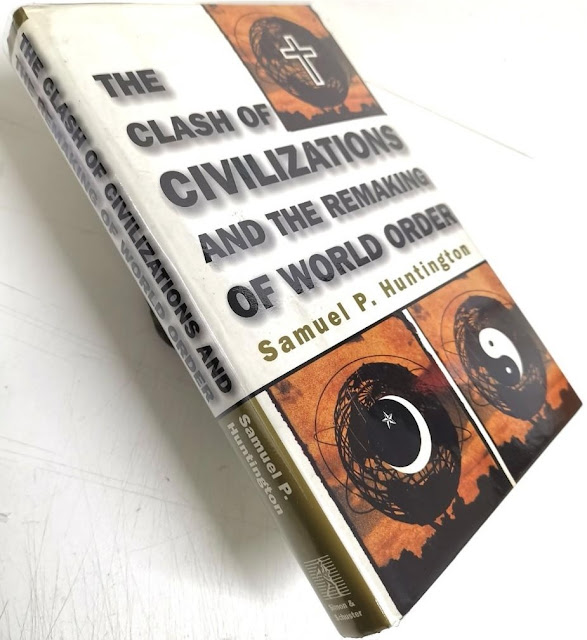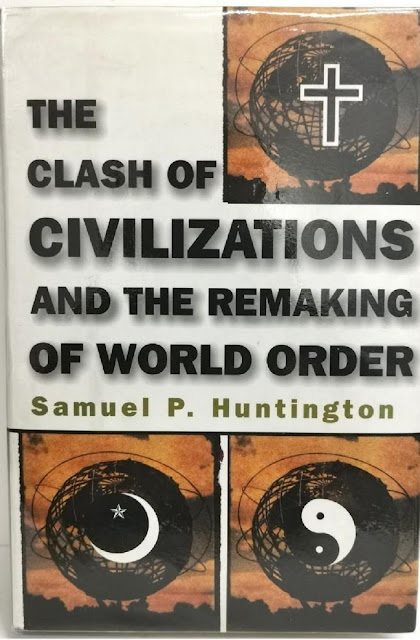"In 1993, Huntington ( Harvard professor and director of Harvard's Center for International Affairs) provoked great debate among international relations theorists with the interrogatively titled "The Clash of Civilizations?", an influential, oft-cited article published in Foreign Affairs magazine. In the article, he argued that, after the fall of the Soviet Union, Islam would become the biggest obstacle to Western domination of the world. The West's next big war therefore, he said, would inevitably be with Islam. Its description of post-Cold War geopolitics and the "inevitability of instability" contrasted with the influential "End of History" thesis advocated by Francis Fukuyama.
sexta-feira, 17 de novembro de 2023
Samuel Huntington, afinal, parece ser este o nome do profeta do nosso tempo
Huntington expanded "The Clash of Civilizations?" to book length and published it as The Clash of Civilizations and the Remaking of World Order in 1996. The article and the book posit that post-Cold War conflict would most frequently and violently occur because of cultural rather than ideological differences. That, whilst in the Cold War, conflict occurred between the Capitalist West and the Communist Bloc East, it now was most likely to occur between the world's major civilizations—identifying seven, and a possible eighth: (i) Western, (ii) Latin American, (iii) Islamic, (iv) Sinic (Chinese), (v) Hindu, (vi) Orthodox, (vii) Japanese, and (viii) African. This cultural organization contrasts the contemporary world with the classical notion of sovereign states. To understand current and future conflict, cultural rifts must be understood, and culture—rather than the State—must be accepted as the reason for war. Thus, Western nations will lose predominance if they fail to recognize the irreconcilable nature of cultural tensions. Huntington argued that this post-Cold War shift in geopolitical organization and structure requires the West to strengthen itself culturally, by abandoning the imposition of its ideal of democratic universalism and its incessant military interventionism. Underscoring this point, Huntington wrote in the 1996 expansion, "In the emerging world of ethnic conflict and civilizational clash, Western belief in the universality of Western culture suffers three problems: it is false; it is immoral; and it is dangerous."
Huntington's last book, "Who Are We? The Challenges to America's National Identity", was published in May 2004. Its subject is the meaning of American national identity and what he describes as a cultural threat from large-scale immigration by Latinos, which Huntington says could "divide the United States into two peoples, two cultures, and two languages". In this book, he called for America to force immigrants to "adopt English" and the US to turn to "Protestant religions" to "save itself against the threats" of Latino and Islamic immigrants.
Huntington is credited with inventing the phrase Davos Man, referring to global elites who "have little need for national loyalty, view national boundaries as obstacles that thankfully are vanishing, and see national governments as residues from the past whose only useful function is to facilitate the elite's global operations". The phrase refers to the World Economic Forum in Davos, Switzerland, where leaders of the global economy meet.
Huntington e o "Clash" na Wikipedia:
Subscrever:
Mensagens (Atom)
Portugal: Falta de Estratégia e de Decisão
Lúcio Vicente Estamos a poucos dias de celebrar os 50 anos de Abril. Porém, Portugal é muito menos do que podia e devia ser. Os 123 mil milh...
-
O nosso velho amigo Alain Juillet decidiu pôr os pontos nos ii sobre o que se passa na Ucrânia, um "caso" que não é em si o "...
-
A golpada de Prigozhin teve apoios de uma rede militar clandestina. "A Ordem da República", um grupo de oficiais que se opõem a...
-
Ponto (possível) da situação militar interna na Rússia, ao início da madrugada de hoje, sábado, pelos nossos amigos da Geopolitical Futures....




